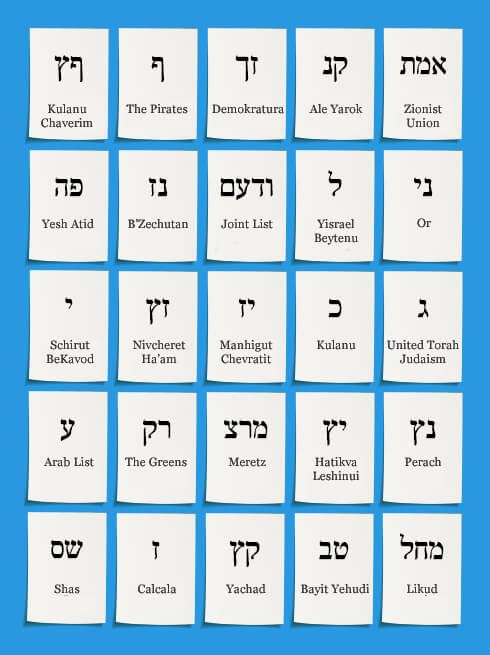Today’s Top Stories
1. It’s only hours before the polling booths open and Israelis elect a new government. Election Day on Tuesday is a national holiday to encourage people to exercise their democratic rights. HonestReporting’s Israel staff will be doing just that but before we do, here are some facts and figures to help you get your head around it all.

Haaretz goes through the numbers (click on the link to find out more about what these numbers mean):
25 – The number of party tickets in the running
1,280 – The total number of people on the tickets
5.8 million – The number of Israelis who can cast their vote
10,372 – The number of regular polling stations
98 – The cities where (some) Israelis can vote around the world
3.25 – The minimum proportion of votes a party needs to get into the Knesset
241.7 million shekels – What all this is costing
But once the votes are in, how are they counted and how are the seats distributed? With a complicated proportional representation system to deal with, YNet News offers a guide for the perplexed.
Here’s one HR staffer’s taken on what Israeli democracy in action looks like.
The polls close at 10pm Israel time on Tuesday night when Israeli media will then release their exit polls and we may have a clearer idea as to who the winners and losers of this election will be.
2. Former UK PM Tony Blair to step back from his Middle East peacemaker role? According to the Financial Times (access through Google News):
After nearly eight years as an envoy for the Quartet of Middle East peace negotiators, the former British prime minister has recognised that a frontline role is no longer tenable, according to several insiders. Mr Blair’s move comes amid deep unease in parts of Washington and Brussels over his poor relations with senior Palestinian Authority figures and sprawling business interests.
The Daily Telegraph adds:
Tony Blair had “no credibility” left with the parties in the Middle East peace process, a former US government official who was closely involved with trying to revive the talks last year has told The Telegraph.
“Frankly all sides just rolled their eyes at the mention of his name,” the official said as it was reported that Mr Blair was being “eased out” of his role as head of so-called Quartet.
3. Iran faces economic ruin if it fails to reach a nuclear deal with the West, according to an internal report commissioned by the regime in Tehran. The Times of London (subscription-only) reports:
The country’s oil and gas sector needs investments of more than $200 billion over the next five years, the report found. Some 60 per cent of Iran’s small and medium-sized businesses have gone bankrupt in the past four years under the West’s sanctions and the recent slump in oil prices promises further misery.
Two weeks before the deadline for a framework deal, the report has persuaded many hardliners in Iran to drop their opposition to negotiations with the West. Ayatollah Ali Khamenei, Iran’s supreme leader, has used it to strong-arm officials into backing the talks.
Israel and the Palestinians
• NPR takes a ride on Jerusalem’s Light Rail, whose trains have been the target of Palestinian stone throwers since last summer.
Around the World
• A senior member of the Saudi royal family has told the BBC that a deal on Iran’s nuclear program will prompt Saudi Arabia and other states to pursue nuclear programs of their own:
Prince Turki al-Faisal told the BBC that Saudi Arabia would then seek the same right, as would other nations.
Six world powers are negotiating an agreement aimed at limiting Iran’s nuclear activity but not ending it.
Critics have argued this would trigger a nuclear arms race in the region spurred on by Saudi-Iran rivalry.
“I’ve always said whatever comes out of these talks, we will want the same,” said the prince, Saudi Arabia’s former intelligence chief.
“So if Iran has the ability to enrich uranium to whatever level, it’s not just Saudi Arabia that’s going to ask for that.
“The whole world will be an open door to go that route without any inhibition, and that’s my main objection to this P5+1 [the six world powers] process.”
Commentary/Analysis
• What do Israelis care about on Election Day? Jonathan Rynhold tells CNN:
The Palestinian issue dominates international news coverage of Israel, with images of missiles, terror tunnels and failed peace negotiations frequently splashed across TV screens and newspapers. So you would think that security would be the central issue in Tuesday’s Israeli elections, right?
The short answer is no.
Poll after poll in Israel has confirmed that the public views the high cost of living as the top issue for voters in this election. Indeed, even a majority of Israel’s Arab citizens within the pre-1967 borders — most of whom identify with the Palestinians in the West Bank and Gaza — view socioeconomic issues as the priority for Tuesday’s parliamentary poll, rather than advancing the Israeli-Palestinian peace process.
What explains this apparent indifference?
First, despite what the polls suggest, peace and security actually remain the most important underlying issue in Israeli politics. The main parties recognize that they need to cross the credibility threshold on this issue, and they therefore include former high-ranking army officers and diplomats among their ranks.
Whatever they may say to pollsters, many voters continue to vote primarily on this issue. However, because most such voters are staunch supporters of the right or the left and have already made up their minds, they are unlikely to shift their vote between these two blocs, so their votes are not in play in these elections.
Featured image: CC BY Henrik Wieduwilt with modifications by HonestReporting
For more, see yesterday’s Israel Daily News Stream and join the IDNS on Facebook.


